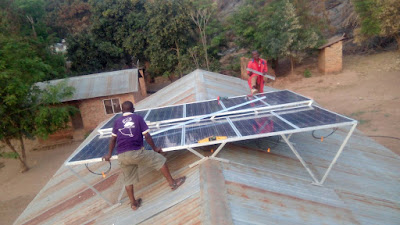28.04.2024
Matthew Matimbwi supported the planning and implementation of
the project to provide hot water and sustainable electricity for lighting to
the girls of Emmaberg Girls High School in Makambako, Njombe, Tanzania
The
project intervened in the challenges of unreliable water supply, unavailability
of hot water for showers and unavailability of lights in the dormitories when
the national grid electricity failed. The project was realized in the
partnership of the Evangelical Lutheran Church in Tanzania-Southern Diocese (ELCT-SD)
and SchuPa Tansania e.V The project was financed by SchuPa and Bavaria State
Chancellery of Germany.
The
school had been experiencing unreliable and costly water supply. The water was
being pumped from a borehole using national grid electricity. The school
experiences frequent, long and uninformed power outages. When there was a power
cut, students had to collect water from the river which is also used by cattle.
The water caused skin and abdominal diseases. Urinary tract infections (UTI)
cases were common. The food preparation in the kitchen was being delayed due to
the untimely delivery of water. In the evening, students had to stay in the
darkness in the dormitories.
The school is located in a cold region. During the winter, the
temperature goes down to 4 Celsius Degree. Since it was expensive to heat
shower water using electricity or firewood, most of the girls avoided showers for
up to a month.
The
partners developed a project “Warm Water for the Female High School Students of
Emmaberg Girls’ School, Tanzania”. The project results were as follows.
a) Project
Outputs
The
immediate results of the project were as follows.
i) The new 4m high water tower
was constructed.
ii) Water tank capacity increased
from 10m3 to 30m3.
iii) Solar PV plant 7.2kW replaced
national grid at 100% for water pump.
iv) Water efficient use and energy
management devices (pump dry-run sensor and tank-overflow controls)
installed in the water system.
v) 2 solar water heaters for
showers 1,500 litres and 2,700 litres installed.
vi) 2 solar photovoltaic systems
0.9kWp and 1.8kWp for dormitories lighting
installed.
vii) 10 teachers trained in solar
systems maintenance.
viii) 200 students sensitized on
renewable energy and best practices of using solar systems and 15 students trained for the
Students’ Solar Service Team.
b) Project
Outcomes
The
intermediate results of the project are as follows.
i) Water supply is efficient,
reliable, clean and uninterrupted.
ii) The school is not spending
money on water pumping electricity bills.
iii) Girls access hot water for
showering.
iv) Girls have reliable and free
electricity for lighting in the dormitories.
v) The school has got solar
maintenance team in place.
vi) Students are aware of the
potential of renewable energy.
vii) The school has a solar service
team, and
viii) The number of girls enrolment
is increasing.
c) Project Impacts
The
expected long-term project results are as follows.
i) Girls’ academic performance
increased.
ii) Girls live healthy.
iii) School enrolment increased to
the maximum capacity.
iv) The school contributed to the
climate change trend reverse by avoiding the
22,378 KgCO2eq/year
through using water heaters, and 445,442 KgCO2eq/year,
for pumping water using
solar photovoltaics.









.jpg)








































